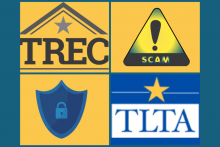
The Texas Real Estate Commission is assisting the Texas Land Title Association (TLTA) in educating license holders of trending fraud schemes.
Over the last several months, TLTA is seeing more people fall victim to seller impersonators. Prime target properties are vacant land or investment property such as vacation homes, second homes, rental properties, and any other instance where the tax mailing address is different than the property owner’s address.
Here's How It Starts
A typical scenario includes the impersonator calling a sales agent for a property to be listed below market value, so that the potential buyer thinks the purchase is a bargain. To lure the agent into taking the listing, the fake seller might say, “This is a quick sale."
“This type of fraud is terrifying because of how much it has increased and how quickly," said David Tandy, chair of TLTA's Seller Impersonation Fraud Task Force. “Until that real seller decides to do something like refinance or sell the property, they are not aware of the fraudulent transaction involving their property. And by that point, the duped buyer has lost all their money, the real estate agents have lost their commissions, and the entire transaction is void.”
Red Flags
- The property in question involves vacant land or an owner not living on property.
- Imposter Seller wants a quick sale.
- Imposter Seller wants a cash sale.
- The property is listed below market value.
- Imposter Seller only wants to communicate by email or text and does not want to meet in person.
- Imposter Seller's phone area code is unrecognizable or foreign.
What To Do
Before listing a property, make sure property owners are verified. Start by getting a copy of two forms of ID. Ask for a recent utility bill. Ask questions about the property that only the true owner would know. Look for the red flags above and trust your gut.
“This just suddenly exploded. We’ve seen similar forged deed fraud in the past, but this new type of fraud is just pervasive" said Leslie Midgley, executive vice president and CEO of TLTA. "These criminals are highly sophisticated with their schemes and hard to detect if you aren’t vigilant. Title agents and underwriters have implemented many best practices to try and shut these transactions down, but there is much work to be done as significant losses have already occurred and the criminals seem to be increasing their efforts, not retreating."
"Realtors are also at risk of representing someone who is not the rightful owner to the property they are trying to sell. Realtors can be a huge part of the solution if they know the red flags to look for and understand how important their role is."
Reporting Fraud
Fraud can be reported online to the Federal Trade Commission. This type of crime is also being tracked by the United States Secret Service.


